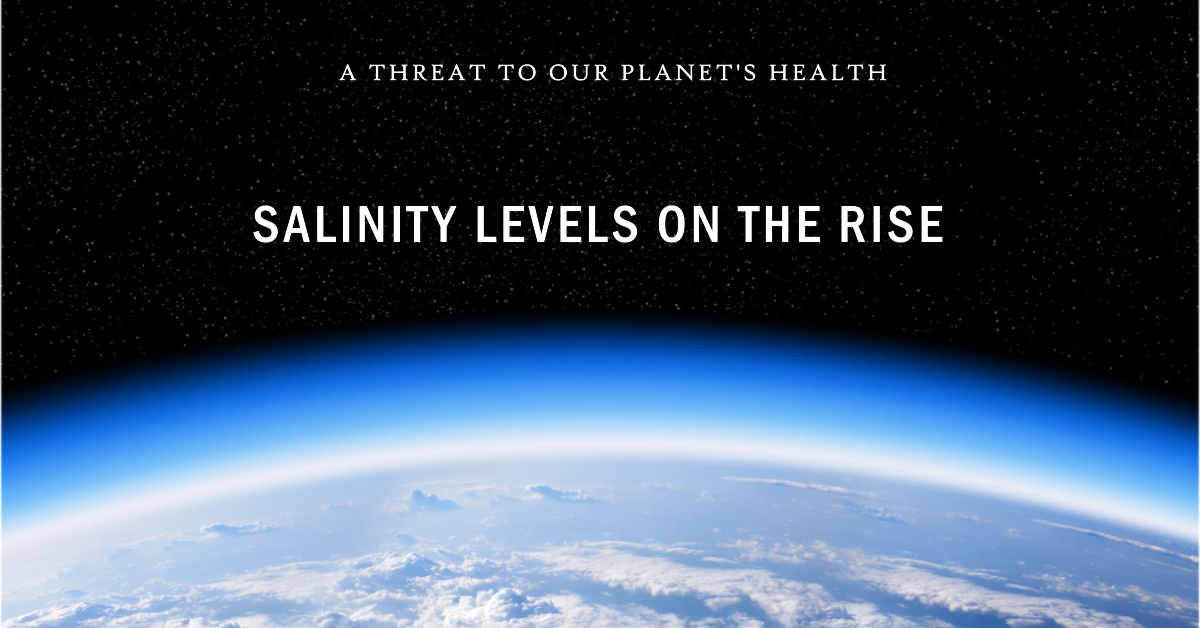Environmental Wake-Up Call: Earth's Rising Salinity Levels
In a world often preoccupied with climate change, another environmental threat is silently growing: the salinity levels of our planet. This blog delves deep into the rising salinity crisis, exploring its causes, consequences, and what we can do to address it. Join us on a journey to uncover this underappreciated challenge and learn how you can be part of the solution.

The delicate balance of our planet's ecosystems is under siege, and it's not just from the more well-known threats like climate change and pollution. Scientists have discovered that Earth's salinity levels are on the rise, and it's high time we woke up to this alarming reality. Imagine a world where our freshwater sources become brackish, marine life struggles to survive, and our soil quality deteriorates. This is the potential future we face if we don't address Earth's growing salinity crisis.
The Salty Intrigue
Salinity refers to the concentration of salt in water, and it plays a vital role in our planet's ecosystems. From the oceans to the soil beneath our feet, salt concentration is a critical factor that affects life on Earth. It influences the behavior of marine organisms, the quality of our drinking water, and the health of our agricultural lands.
Unearthing the Culprits
So, what's causing Earth's salinity levels to rise? The answer is multifaceted, but human activities are a significant contributor. Deforestation, over-irrigation in agriculture, and the excessive use of salt in road de-icing are among the primary factors. As we exploit our planet's resources and modify the landscape, we inadvertently disrupt the delicate balance of salt in our environment.
-
Over-Irrigation: Agriculture is essential for our survival, but the excessive use of irrigation can lead to the buildup of salts in the soil. This affects crop health and reduces agricultural productivity, ultimately posing a threat to global food security.
-
Road De-Icing: During the winter months, salt is commonly used to de-ice roads for safer driving. However, this salt runoff eventually makes its way into our freshwater sources, compromising their quality.
-
Deforestation: The removal of trees and vegetation disrupts the natural water cycle, leading to increased salinity in water bodies, including rivers and lakes.
The Impact on Life as We Know It
The consequences of Earth's rising salinity are far-reaching and immediate, impacting both land and sea.
Marine Life: Our oceans are home to a staggering array of life, from coral reefs to various fish species. Rising salinity threatens these ecosystems by affecting the reproductive and feeding habits of marine organisms. For example, it can disrupt the natural buoyancy of fish eggs and larvae, making it harder for them to survive.
Freshwater Sources: In many parts of the world, freshwater sources are already a scarce commodity. As salt infiltrates these sources, the quality of drinking water declines, affecting not only humans but also the wildlife that relies on these freshwater habitats.
Agriculture: Salinity can be devastating for agriculture. As salt levels in the soil rise, crops become less productive, and land becomes less arable. This poses a significant challenge to global food production.
Our Call to Action
The rise in Earth's salinity levels should serve as a wake-up call for humanity. We must recognize the severity of this crisis and take meaningful steps to address it.
Sustainable Land Use: Reevaluating our approach to land use and agriculture is crucial. Implementing more efficient irrigation techniques, practicing responsible land management, and reducing salt usage in road maintenance are steps in the right direction.
Desalination Technology: In regions where freshwater scarcity is a pressing issue, investing in desalination technology can help provide a steady supply of fresh water without contributing to rising salinity.
Awareness and Education: Raising awareness about the salinity crisis is vital. When people understand the consequences of their actions, they are more likely to make sustainable choices.
Conclusion
Earth's rising salinity levels may be the "sleeping giant" of environmental problems, but it's no longer lurking in the shadows. It's time to face this growing crisis head-on. By taking steps to reduce over-irrigation, find sustainable alternatives to road de-icing, and promote responsible land use, we can work together to restore the balance and ensure a healthier, salt-free future for all. As stewards of this planet, we have a responsibility to protect the environment for future generations. Let's embrace the challenge and be the change our planet desperately needs.










